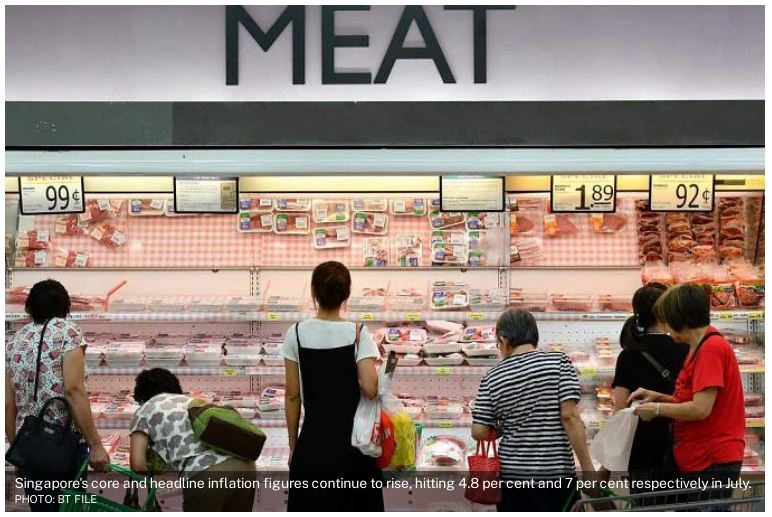Singapore core inflation rises to 4.8% in July but official full-year forecasts unchanged
SINGAPORE’S core inflation rose to a new high of 4.8 per cent in July, the second straight month in which it exceeded the 4 per cent rate last breached during the global financial crisis, according to consumer price index figures from the Department of Statistics on Tuesday (Aug 23). This was a hair above economists’ expectations of 4.7 per cent in a Bloomberg poll, and up from 4.4 per cent in June.
Meanwhile, July’s headline inflation – which includes accommodation and private transport costs – was in line with economists’ expectations at 7 per cent, up from 6.7 per cent in June and representing another multi-year high.
But the Monetary Authority of Singapore (MAS) and the Ministry of Trade and Industry (MTI) maintained their full-year forecast ranges of 3 to 4 per cent for core inflation and 5 to 6 per cent for headline inflation, having just raised these in July.
Economists also maintained their current expectations for further policy tightening at the next MAS policy meeting in October, though they were mixed on whether an even earlier off-cycle tightening might occur.
In a research note, Barclays economist Brian Tan noted that July’s core inflation figure exceeded the 4 to 4.5 per cent range that MAS managing director Ravi Menon had said would be the likely Q3 peak. He does not rule out MAS policy tightening coming “even sooner” than October.
But Selena Ling, chief economist and head of treasury research and strategy at OCBC, does not think that July’s higher inflation figures imply that an off-cycle move “is imminent”, as the Singapore dollar nominal effective exchange rate “is fairly well behaved and contained around +1 per cent region above its parity”.
OCBC maintained its full-year headline and core inflation forecasts at 5.5 per cent and 4 per cent respectively, within the official ranges.
Barclays maintained its core inflation forecast at 4.2 per cent for 2022, above the MAS’ range, but now expects this rate to sustain into 2023, up from their previously predicted 4 per cent rate for the next year.
The MAS and MTI said in a joint statement that the pickup in inflation was led by stronger increases in the prices of food as well as electricity and gas. Electricity and gas costs recorded the most significant increase, increasing by 24 per cent from the year before, in an acceleration from June’s 20 per cent increase. This was due to a larger increase in electricity and gas tariffs.
On the bread-and-butter front, food inflation was 6.1 per cent, up from 5.4 per cent in June, pushed up by price increases for both cooked and non-cooked food.
Apart from higher core inflation, private transport and accommodation inflation also intensified in July. Private transport inflation rose to 22.2 per cent on a stronger pickup in car prices, up from 21.9 per cent in June. Accommodation inflation was 4.6 per cent, up from 4.2 per cent before, as housing rents rose at a faster pace.
Among the categories in MAS and MTI’s release, only retail and other goods bucked the trend. Their prices rose at a slower rate of 2.8 per cent, compared to 3.1 per cent in June.
The MAS and MTI largely maintained their wording for Singapore’s inflation outlook from the previous month’s release, noting that although global supply chain frictions have eased slightly and some commodity prices have levelled off, global inflation is likely to stay elevated in the near term.
On the domestic front, the labour market remains tight, and with firm consumer spending, businesses are likely to pass on cost increases to consumer prices, MAS and MTI said. They added that car and accommodation cost increases are also likely to stay firm for the rest of the year.
But Barclays’ Tan noted that the MAS and MTI statement no longer says that core inflation is “projected to peak in Q3”, as was the case in last month’s statement. Instead, it is now “projected to stay elevated over the next few months, before it begins to ease towards the end of the year” – “which seems to imply core inflation rising for longer than policymakers had earlier expected,” added Tan.
Source: https://www.businesstimes.com.sg/government-economy/singapore-core-inflation-rises-to-48-in-july-but-official-full-year-forecasts


 Thailand
Thailand




